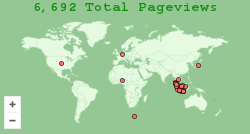Training on awareness of consuming halal and nutritious food among Indonesian migrant workers in Taiwan
DOI:
https://doi.org/10.63088/ec8hfz88Keywords:
Nutritious food, Halal food, Halal awareness, Migrant workersAbstract
Purpose: Awareness on consuming halal and nutritious food within the global Muslim community requires thorough more exploration. This activity aims to enhance understanding and practices of selecting halal and nutritious food among Indonesian migrant workers (IMWs) in Taiwan also to assess the knowledge level of consuming halal and nutritious food and examine its association with gender.
Methods: The community service method included delivering lectures and training for Indonesian migrant workers in Taiwan, with a total of 21 participants. To assess the success of the training, an evaluation was conducted by giving a post-test. The analysis included descriptive and Chi-Square to examine the association between gender and the knowledge level of consuming halal and nutritious food.
Results: Among the participants, 57.1% achieved high scores, while 42.9% were in the low-score regarding the knowledge level of halal and nutritious food consumption. The analysis result of this study revealed there was no statistically significant association between gender and the level of knowledge of consuming halal and nutritious food among Indonesian migrant workers in Taiwan, with a p-value of 0.350.
Conclusions: This study highlights the significant enhancement for Indonesian migrant workers' knowledge of halal and nutritious food in Taiwan through facilitator training, suggesting that future community programs should include continuous support, advanced training, and collaborations with local halal food providers to improve accessibility, with further research exploring the attitudes and preferences related to halal food consumption, including gender and cultural dynamics.
Downloads
References
Akın, M. S., & Okumuş, A. (2021). Shaping the consumers’ attitudes towards Halal food products in Turkey. Journal of Islamic Marketing, 12(6), 1081–1096.
Ali, M. Q., & Ahmad, N. (2023). The Factors that affect Halal Food and Food Products Awareness and Different Challenges: an overview. Journal of Agribusiness Marketing, 10(1).
Al-Mahmood, O., Bridges, W. C., Jiang, X., & Fraser, A. M. (2021). A longitudinal study: Microbiological evaluation of two halal beef slaughterhouses in the United States. Food Control, 125, 107945.
Asri, Y., & Chuang, K.-Y. (2023). Prevalence of and Factors Associated with Depressive Symptoms among Indonesian Migrant Workers in Taiwan. International Journal of Environmental Research and Public Health, 20(5), 4056.
Azharita, R., Rahmi, H., & Yuniarti, F. (2023). Edukasi Kehalalan pada Produk Pangan untuk Anggota Aisyiyah Jatimakmur. Jurnal SOLMA, 12(3), 1047–1055.
Diah Permanasari, E., Siska, S., Rahmadini, N., Chandra, A., Cresidanto, B., Qadhi Zakka, G., & Awwaliyah, R. (2024). Edukasi Sertifikasi Halal Tingkatkan Daya Saing Produk Usaha Mikro dan Kecil (UMK) di Wilayah Jakarta Selatan. Jurnal SOLMA, 13(1), 430–436.
Egele, V. S., & Stark, R. (2023). Specific health beliefs mediate sex differences in food choice. Frontiers in Nutrition, 10.
Gusman, Y. (2024). The Endeavour of Indonesian Female Migrant Workers in Taiwan in Building Family Resilience. Journal of Social Development Studies, 5(1), 16–30.
Kantor Dagang dan Ekonomi Indonesia (KDEI). (2024). Maraknya Kasus PMI Sakit dan Meninggal Dunia di Taiwan, KDEI Taipei Usulkan Proteksi Tambahan. Retrieved on 2025/2/19. Available at https://www.kdei-taipei.org/news/maraknya-kasus-pmi-sakit-dan-meninggal-dunia-di-taiwan-kdei-taipei-usulkan-proteksi-tambahan-2642.html?utm_source
Khan, I. A. (2023). The advantages of halal food for health and well-being. Journal of Clinical and Basic Research, 7(4), 23–24.
Mohamed, Y. H., Abdul Rahim, A. R., & Ma’aram, A. (2020). The effect of halal supply chain management on halal integrity assurance for the food industry in Malaysia. Journal of Islamic Marketing, 12(9), 1734–1750.
Nisbet, C., Lestrat, K. E., & Vatanparast, H. (2022). Food Security Interventions among Refugees around the Globe: A Scoping Review. Nutrients, 14(3), 522.
Palupi, K. C., Shih, C.-K., & Chang, J.-S. (2017). Cooking methods and depressive symptoms are joint risk factors for fatigue among migrant Indonesian women working domestically in Taiwan. Asia Pacific Journal of Clinical Nutrition, 26(S1), s61–s67.
Rezai, G., Mohamed, Z., & Shamsudin, M. N. (2015). Can Halal Be Sustainable? Study on Malaysian Consumers’ Perspective. Journal of Food Products Marketing, 21(6), 654–666.
Rifa’i, M. N. (2018). Promosi Makanan Halal di Kota Taipei, Taiwan. FALAH: Jurnal Ekonomi Syariah, 3(1), 111.
Sawari, M., Salwa, S., Rahman Abd, & Hidayah Nur. (2018). Exploring Halal food preferences across age and gender.
Sun, Q., Li, X., & Rahut, D. B. (2021). Gender Differences in Nutritional Intake among Rural-Urban Migrants in China. International Journal of Environmental Research and Public Health, 18(18), 9821.
Suparman, S. (2015). MENENTUKAN CUT SCORE PADA EVALUASI PENDIDIKAN. https://api.semanticscholar.org/CorpusID:192354668
Wim, N. M., Rahardjo, T., & Qurrota Ayun, P. (2024). Adaptasi Budaya Pekerja Migran Indonesia Di Taiwan. Interaksi Online, 12(3), 926–938.
Downloads
Published
Issue
Section
License
Copyright (c) 2025 Ari Setyawan, Ony Linda, Chica Riska Ashari

This work is licensed under a Creative Commons Attribution 4.0 International License.
Authors retain copyright and grant the journal right of first publication with the work simultaneously licensed under a Creative Commons Attribution 4.0 International License that allows others to share the work with an acknowledgement of the work's authorship and initial publication in this journal.





